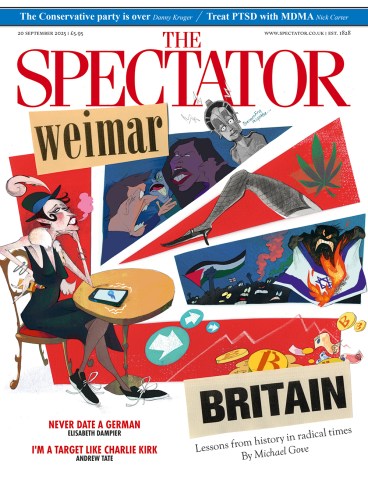
The shale illusion
Sir: Your leading article rightly makes the case for extracting as much of our North Sea resources as we can (‘All at sea’, 6 September). However the enthusiasm for developing shale gas is misplaced.
As energy minister, I commissioned work to establish how much of the onshore gas in-place could be recovered. The truth is just a small proportion – maybe 10 per cent. An energy policy based on shale would put our energy security at risk. Economically, at a time when global gas prices are expected to fall, UK shale would simply not be competitive and projects would fail. It is no accident that none of the large energy companies thought it was worth seriously exploring shale.
With domestic shale being at a higher cost than imported gas, it penalises consumers with higher charges than would be necessary. Politically, it is by far the most unpopular form of energy I have ever come across. An energy policy based on the illusion of what shale gas might deliver means that we would spend too little time planning for the circumstances that would actually occur. We will lose the chance to make long-term gas contracts at favourable rates. We would end up even more dependent on imported gas and would have to play catch-up in harnessing our own renewable resources.
So, yes, let’s maximise North Sea output, but let’s not be tempted down a path that would leave the country and consumers more exposed over the years to come.
Charles Hendry
London SW11
Show of force
Sir: I read Max Jeffery’s article (‘Force majeure’, 6 September) about the rise of volunteer groups and businesses offering what might best be described as Watch services: patrolling the streets, arresting offenders, breaking up fights and generally being a deterrent. Three thoughts struck me.
First, that this was very similar to the position before Robert Peel and his official police – urban parishes employed watchmen to provide a deterrent and to chase offenders, while in rural parishes one of the ‘volunteer’ offices was the parish constable. In town and country alike, private enterprise provided detective services and there were associations to fund and conduct private prosecutions in the name of victims of crime.
The second thought was that before we had official police, the Tories opposed their introduction on the grounds that they would start spying on people and acting to enforce the will of politicians, arresting people critical of the government.
Third, that Mr Jeffery is mistaken in supposing the police to be understaffed. If the Met can send five armed officers to arrest one comedy writer for social media posts, they are clearly not short of officers. That the Commissioner of Police of the Metropolis has called for legislation to redirect his officers’ efforts away from social media posts and on to actual crime shows considerable defects in the way that police forces are run.
Dr Richard Austen-Baker
Lancaster University Law School, Lancaster
Dog tricks
Sir: I should like to add a nuance to William Atkinson’s largely pejorative article on ‘emotional support animals’ (‘Heavy petting’, 6 September). As the owner of an extremely well-behaved spaniel, Pippa (aka Her Wagginess, the Furry Princess), I have found the concept extremely useful on several occasions when her entry has been denied in shops where there is no obvious reason – such as hygiene – for the exclusion. Depressingly, this is becoming a more common occurrence. Saying she is my therapy dog usually produces an immediate retraction and sometimes even an apology.
Dr Julian Critchlow
Ditcham, Hampshire
Tribute act
Sir: Julie Burchill writes that ‘it is a shame people aren’t asked to write their own obituaries’ (‘Burchill was acid undiluted’, 13 September). I did exactly that for my 70th birthday to give to my children – primarily so that whoever gives the eulogy at my funeral says it the way I want it. When I told our vicar I had done this, she warned me that in her experience no one could be trusted and I should ‘make a video’.
Neil Kennedy
Burnham-on-Crouch, Essex
What a banger
Sir: Olivia Potts’s ‘Notes on… Sausages’ (13 September) reminded me of William Harris, surely Britain’s most enterprising sausage vendor ever, known in his late Victorian heyday as ‘the sausage king’. His genius at self-publicity – his trademark depicted him winning the ‘Pork Sausage Derby’ on a fat porker and in attire comprising dress suit and opera hat in place of butcher’s apron – helped him grow his empire to dozens of shops, spread fame of his sausages worldwide. His success led Rudyard Kipling, in his autobiography Something of Myself, to recall once lodging above the ‘establishment of Harris the Sausage King, who, for tuppence, gave as much sausage and mash as would carry one from breakfast to dinner’.
Peter Saunders
Salisbury, Wiltshire
Breaking the mould
Sir: There is surely a significant difference between the Liberal-SDP Alliance and Reform UK (Notes, 13 September). The SDP was a Westminster confection without general public support. Reform has massive public support (more than 240,000 paid subscriptions) but as yet only limited presence at Westminster. The fact that a Westminster creation failed is no guide to the future of a nationwide political movement.
Peter Clery
Sutton Bridge, Lincolnshire
Write to us The Spectator, 22 Old Queen Street, London SW1H 9HP letters@spectator.co.uk







Comments